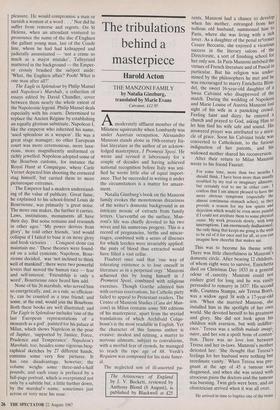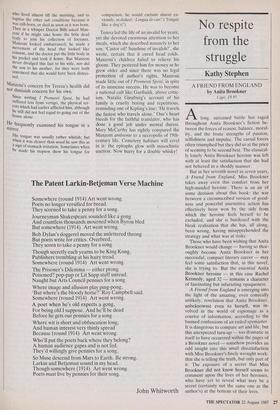The tribulations behind a masterpiece
Harold Acton
THE MAN ZONI FAMILY by Natalia Ginzburg, translated by Marie Evans
Carcanet, £12.95
Amoderately affluent member of the Milanese squirearchy when Lombardy was under Austrian occupation, Alessandro Manzoni stands alone in 19th-century Ita- lian literature as the author of an acknow- ledged masterpiece, I Promessi Sposi. He wrote and revised it laboriously for a couple of decades and having achieved national recognition before Italy was uni- fied he wrote little else of equal import- ance. That he succeeded in writing it under the circumstances is a matter for amaze- ment.
Natalia Ginzburg's book on the Manzoni family evokes the monotonous dreariness of the writer's domestic background in an intricate mosaic of extracts from family letters. Uneventful on the surface, Man- zoni's life was chiefly devoted to his two wives and his numerous progeny. This is a record of pregnancies, births and miscar- riages, combined with a series of illnesses for which leeches were invariably applied: the pints of blood thus extracted would have filled a vast cellar.
Flaubert once said that 'one way of tolerating existence is to lose oneself in literature as in a perpetual orgy.' Manzoni achieved this by losing himself in I Promessi Sposi, combined with religious exercises. Though Goethe admired him with certain reservations, his Catholic piety failed to appeal to Protestant readers. The Centre of Manzoni Studies (Casa del Man- zoni) in Milan contains some 500 editions of his masterpiece, apart from the myriad translations of which Archibald Colqu- houn's is the most readable in English. Yet the character of this famous author is evasive: modest and retiring, a martyr to nervous ailments, subject to convulsions, with a morbid fear of crowds, he managed to reach the ripe age of 88. Verdi's Requiem was composed for his state funer- al.
The neglected son of ill-assorted pa- rents, Manzoni had a chance to develop when his mother, estranged from her tedious old husband, summoned him rich Paris, where she was living with a rich lover. As a daughter of the penal reformer Cesare Beccaria, she enjoyed a vicarious success in the literary salons of the Directorate, a sort of finishing school for her only son. In Paris Manzoni imbibed the virtues of French literature and of Pascal in particular. But his religion was under- mined by the philosophers he met and he was encouraged to marry Enrichetta Blon- del, the sweet 16-year-old daughter of a Swiss Calvinist who disapproved of the match. During the wedding of Napoleon and Marie Louise of Austria Manzoni lost sight of his wife in a panicking crowd. Feeling faint and dizzy, he entered a church and prayed to God, asking Him to let him find his wife safe and sound. His answered prayer was attributed to a mira- cle of grace. Soon his Calvinist bride was converted to Catholicism, to the furious indignation of her parents, and his widowed mother shared his reconversion..
After their return to Milan Manzom wrote to his friend Fauriel:
For some time, more than two months I should think, I have been more than usually troubled by my real or imaginary ailments, but certainly real to me in either case. I confess that I am almost pleased to have the more obvious symptoms (especially the almost continuous stomach aches), as they provide a reason for my low spirits and dejection which would be even more painful if I could not attribute them to some physical cause. My work proceeds slowly, with long interruptions. I am enormously disillusioned; the only thing that keeps me going is the wish to be rid of it for once and for all, so you can imagine how cheerful that makes me.
This was to become his theme song. There was little cheerfulness in Manzoni's domestic circle. After bearing 12 children, of whom eight were to survive, Enrichetta died on Christmas Day 1833 in a general odour of sanctity. Manzoni could not endure grief for long and he was easily persuaded to remarry in 1837. His second wife, Countess Stampa, née Teresa Born, was a widow aged 38 with a 17-year-old son. 'When she married Manzoni, she installed him in the spotlight of her own world. She devoted herself to his greatness and glory. She did not look upon his children with aversion, but with indiffer- ence.' Teresa was a selfish malade imagt; naire, and her son a spoilt bone of conten- tion. There was no love lost between Teresa and her in-laws. Manzoni's mother detested her: 'She thought that Teresa's feelings for her husband were nothing but inordinate vanity.' When Teresa was pre- gnant at the age of 45 a tumour was diagnosed, and when she was seized with atrocious pains the doctors said the tumour was bursting. Twin girls were born, and an obstetrician arrived when it was all over.
He arrived in time to baptise one of the twins
who lived almost till the morning, and to baptise the other sub conditione because it was still-born, or died as soon as it was born. Then in a whisper Doctor Billi asked Man- zoni if he might take home the little dead body to join his collection of foetuses. Manzoni looked embarrassed; he made a movement of the head that looked like consent, and the doctor put the little body in his pocket and took it home. But Manzoni never divulged this fact to his wife, nor did the son to his mother, for they were both convinced that she would have been distres- sed.
Manzoni's concern for Teresa's health did not diminish concern for his own.
Since writing I Promessi Sposi, he had suffered less from vertigo, the physical ter- rors which had earlier afflicted him, although he still did not feel equal to going out of the house alone.
He frequently examined his tongue in a Mirror.
His tongue was usually rather whitish; but when it was clearer than usual he saw this as a sign of stomach irritation. Sometimes when he made his stepson show his tongue for
comparison, he would exclaim almost en- viously, in dialect: 'Lengua de can." ('Tongue like a dog's!') Teresa led the life of an invalid for years, yet she devoted enormous attention to her meals, which she described minutely to her son. 'Castor oil! Sunshine of invalids!', she wrote, certain that it cured head colds. Manzoni's children failed to relieve his gloom. They pestered him for money as he grew older and since there was no legal protection of author's rights, Manzoni made little out of I Promessi Sposi, in spite of its immense success. He was to become a national cult like Garibaldi, above critic- ism. Natalia Ginzburg's account of his family is cruelly boring and repetitious, reminding one of Kipling's line: 'He travels the fastest who travels alone.' One's heart bleeds for the faithful translator, who has done a good job under mental duress. Mary McCarthy has rightly compared the Manzoni anthiente to a necropolis of 19th- century life. Cemetery habitues will revel in it: the epitaphs glow with masochistic unction. Now hurry for a double whisky!











































 Previous page
Previous page